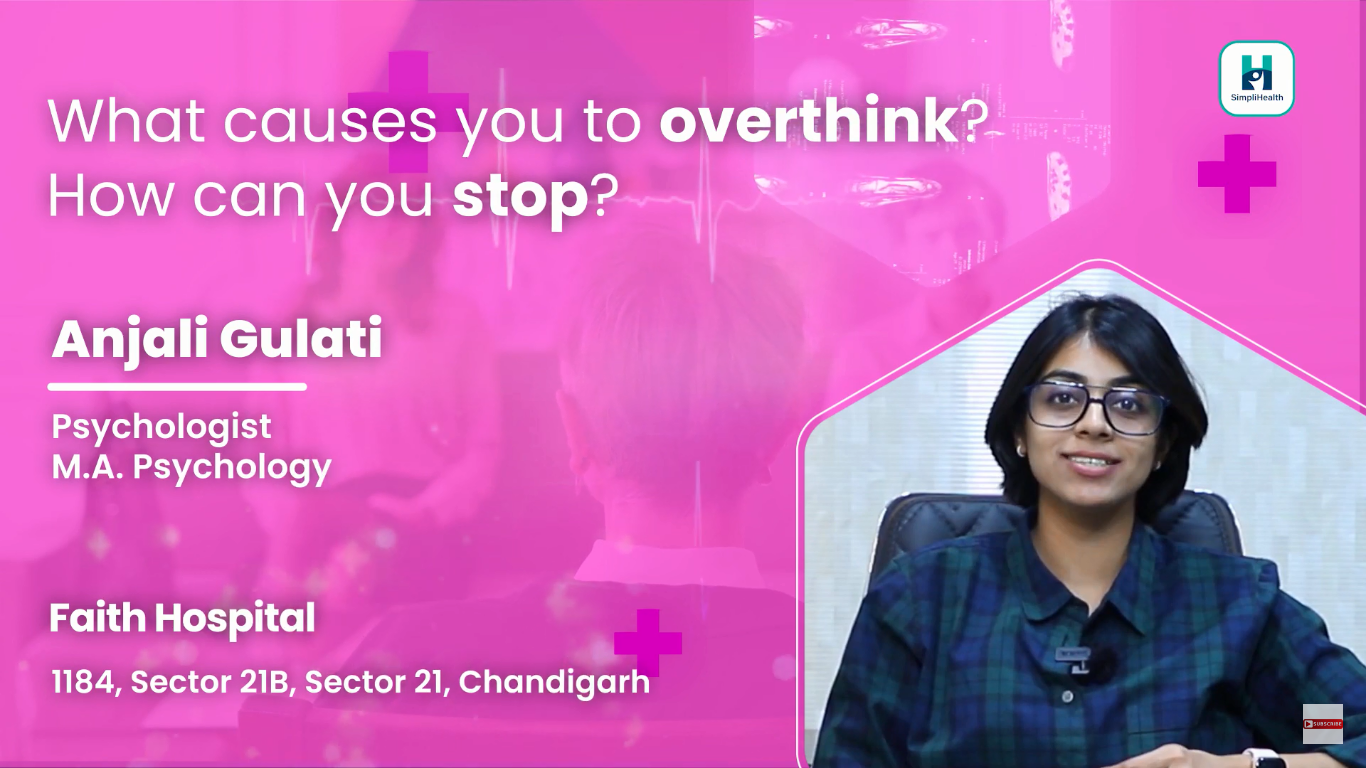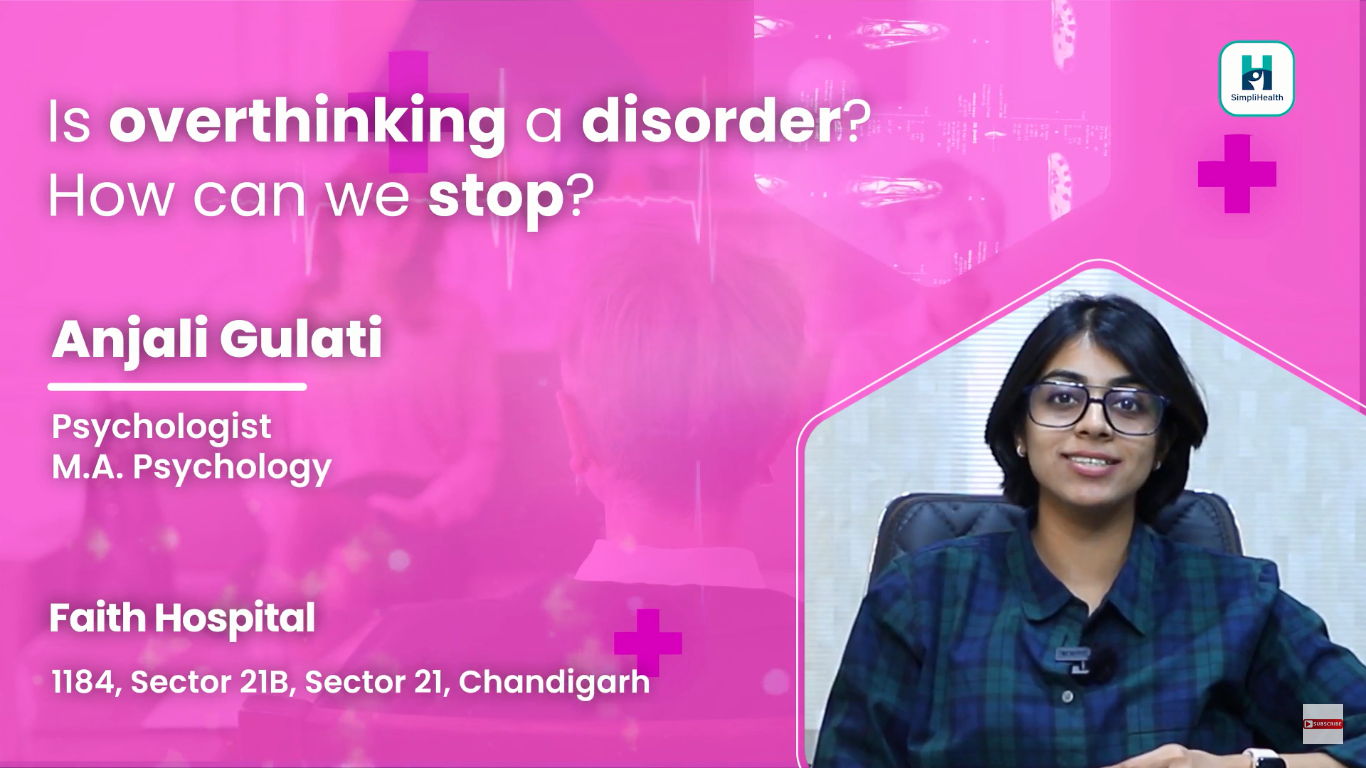How to Stop Overthinking? | How to Overcome Overthinking? | सोचना बंद कैसे करें? | दिमाग में फालतू विचार क्यों आते हैं? | ओवरथिंकिंग के नुकसान? | सोचने की बीमारी का इलाज?
In this video, Ms.Anjali Gulati, a Psychologist from Faith Hospital, Chandigarh, discusses ways to stop overthinking.
How to Stop Overthinking? How to Overcome Overthinking?, Much medical science has come up with psycho-socio, biosocial factors, and even genetic factors that cause overthinking. So what are the chemical and physical factors? In medical terminology, some chemical factors are neurotransmitters in the body or brain. So when the concentration of the neurotransmitters reduces, or the level of neurotransmitters lessens, some imbalance occurs. This imbalance makes the person more vulnerable to thinking about negative things. And eventually, they keep overthinking. One of those neurotransmitters is a serotonin and with a similar spectrum is norepinephrine.
How upbringing causes overthinking in children?
Another factor is the body’s sympathetic nervous system. Studies indicate that the overdrive of the sympathetic nervous system increases anxiety. And with the increase in anxiety, there is an increase in negative thoughts and emotional weakness. Then there are social factors. Often, the upbringing of the child affects their mental balance. Most of the time, parents raise their kids in a very protective environment. Parents want the best for their children and don’t want to expose them to negativity. In this way, the parents are not telling their children about the obvious dangers of life. Obvious things that they should learn or experience, and learn to become resilient for it. But after they enter the world, it seems more dangerous to them. So when they go out, over-protective children will always be anxious.
What is consequential thinking ?
They get into consequential thinking. A lot of time, one becomes very calculative and believes that one thing would result in another. So because of this, exposure to obvious regular stimuli reduces. In the cognitive theory of overthinking, one overestimates the dangerous situation. If a small concern exists, you will create many scenarios and make it this big. So you overestimate the intensity and can’t estimate the situation’s calculative sense.
How to stop overthinking?
The best approach that people have found is medicine and therapy. First, try to notice and acknowledge that you are an overthinker and that you have understood that there is science and ways you react far from the ordinary. Next is labelling it. I am overthinking because of this and because I am afraid of that. Because you are now giving yourself a reason for overthinking makes sense. The second is to be able to redirect yourself in the direction of healthy thinking. The third thing is to schedule your time for overthinking. Call for every scenario and whatever my mind can go through; cross the limit of overthinking, and when the alarm is off, you stop and get back to work. So what you are doing in this is redirecting yourself that this much time you will spend on overthinking. Now I am done.
Ways to cope with overthinking
The next thing is to shift from the negative to the present moment. You know the core of overthinking is negativity. What you can do in this situation comes to the present moment. Now negativity is where you are going, then come to the present moment. Focus on what you are doing now, about the good things happening around you. By doing this, your overthinking will disconnect. The next point is to go from fuzzy thinking to a more detailed review. You are defining your anxiety in a more generalized and vague form.
The last is thinking of two types, anxiety, deep thinking, and remuneration; people seek two types of approaches: problem-oriented or solution oriented. Overthinking would compel you to think of a problem to the extreme and why it is. What is happening, when it will happen etc. Here is what you are doing: stick to the problem, but a solution-oriented approach will give you a jump start. It will disconnect you from the situation; okay, now this is the problem; what can we do as a solution? You can talk to a person, speak to a professional, or take medicine; this will shift you from a problem-based approach to a solution-based process and help your brain work smartly, and the work can happen more healthily.
To know more, watch the full video and visit our SimpliHealth website for more information.

